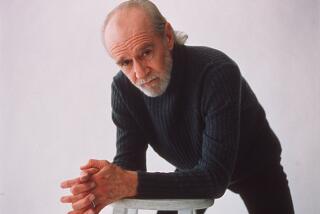Period of Turmoil Paved Way for Chaplin Masterpiece ‘The Kid’
- Share via
“The Kid,” made during one of the more tumultuous periods of Charlie Chaplin’s life, is considered one of the filmmaker’s masterpieces.
Chaplin had unhappily married young actress Mildred Harris in 1918, when he believed she was pregnant. It was a false alarm. The next year, when Harris and Chaplin did conceive a child, he was born with severe defects and died within a few days.
Projects at Chaplin’s studio were going in fits and starts. He would film bits of “The Waif” --the early working title for “The Kid”--only to put it aside for weeks and take up another short film. But soon Chaplin realized that “The Kid” was destined to be a larger project than his other 15- to 30-minute comedies, and threw himself into it.
The film opens with an unwed mother (Edna Purviance) leaving her child in a fancy car with a note asking the owner to take care of her infant son. The car, however, is stolen and the thieves dump the newborn into an alley where he is found by Chaplin’s Tramp character, an unwilling parent.
But years later, when the child is taken away to live in an orphanage, the Tramp goes to elaborate lengths to rescue the boy.
By 1920, Chaplin’s home life had deteriorated. He and Harris had separated and she eventually filed for divorce. The two couldn’t, however, reach a financial settlement, and Harris had the court place a restraining order on “The Kid,” so Chaplin couldn’t sell it.
Afraid that either his ex-wife’s lawyers, or the film distributing company--whom Chaplin thought were in cahoots--would steal the negatives, Chaplin packed up 12 crates full of film and took a train to Utah, where he edited most of “The Kid” in a hotel room.
*
The hourlong film finally was released in January 1921 after the Chaplin-Harris divorce. (The film actually offers a glimpse of Chaplin’s next wife, Lillita McMurray--who later changed her name to Lita Grey--as an angelic temptress.) In the next three years, “The Kid” played in 50 countries around the world, launching 5-year-old Jackie Coogan to international stardom.
“The Kid” secured Chaplin the most universally laudatory reviews of his career and at the time was second only to D.W. Griffith’s “Birth of a Nation” in box-office returns.
In 1952, at the height of McCarthyism, the British-born Chaplin was denied reentry into the United States after a trip to Europe. U.S. Atty. Gen. James P. McGranery implied that Chaplin had ties to the Communist Party and was of “unsavory character.”
Chaplin moved his family to Switzerland and didn’t return to America for 20 years. When he did, it was for an honorary gala at Lincoln Center. More than 2,500 people turned out to see Chaplin and two films: “The Idle Class” and “The Kid.”
More to Read
Only good movies
Get the Indie Focus newsletter, Mark Olsen's weekly guide to the world of cinema.
You may occasionally receive promotional content from the Los Angeles Times.








